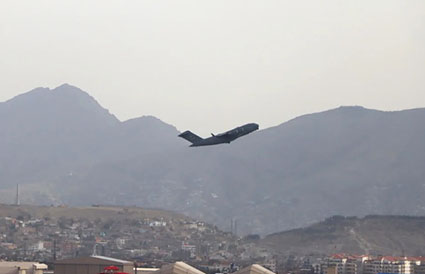Special to WorldTribune.com
The dust is now settling on an unmitigated military disaster and a stinging political humiliation for the United States’ standing in the world.
The unfolding Afghan fiasco confronts Washington policymakers with complicated Rubik’s cube choices in the wake of Kabul’s collapse. The Biden Administration’s next moves will affect America’s stature before its foes and, as significantly, among its nervous allies from the Baltic states to the Taiwan Straits and the Korean peninsula.
We are in a Saigon moment, now having recognized and begun to process the complete collapse of a South Asian ally or partner — whatever you wish to call it — to a likely repeat performance of the very Taliban regime we toppled twenty years ago following the September 11th attacks on America.

So let’s turn to the Rubik’s cube for complicated options:
Kabul Airport. U.S. and Allied forces have conducted an amazing and risky airlift of civilians from the besieged Kabul Airport. American civilians and Afghan allies who helped the U.S. security effort were evacuated under the guns of the enemy. Yet the timetable has been set by the Taliban and perimeter security entrusted to the Taliban in a kafkaesque ending of America’s 20-year Afghan engagement. It’s little wonder that many Americans and local partners will be left behind in the mayhem.
The tragic but predictable deaths of twelve U.S. Marines and a Navy Corpsman, the largest number of American military casualties in a decade, as well as over 100 Afghan civilians to a terrorist bomb only reinforced the folly of using a near indefensible airport since having foolishly pulled out of the strategic Bagram base.
Afghanis Fight on in Panjshir Valley. Not everybody has surrendered. About 60 miles northeast of Kabul, tough Tajik rebels hold firm against their historic Taliban enemy. Panjshir presents a noble resistance among Afghan fighters led by Ahmad Massoud, son of the legendary “Lion of the Panjshir,” who blocked Soviet forces in the 1980’s and later the Taliban in the 1990’s from conquering the region.
Many Afghan army soldiers have fled to the free enclave. Former Vice President Amrullah Salleh now leads this resistance redoubt in the rugged mountains. They have not asked for American weapons but for international recognition as Afghanistan’s legitimate government.
Afghan Women. Women and girls are particularly vulnerable and rightfully frightened of the return of Taliban Islamic fundamentalist rule. During the past twenty years, Afghan women made significant social and economic strides. In 2001, no girls were enrolled in formal schools and there were only one million boys enrolled, according to the World Bank. By 2020, 3.5 million girls were in school throughout the country of 38 million people. The literacy rate had risen to 43 percent, according to UNESCO.
Such gains, particularly education and expanding social rights are now in peril. Prominent Afghan women’s rights activist Fatima Gailani told an interview on the German Deutsche Welle news site, “the future of Afghanistan has to include all of us. Men and women. All languages, all ethnic groups. All the sects in Islam. Our Hindus and our Sikhs.” She lamented that the ousted Afghan President Ashraf Ghani is a “national traitor.” To Joe Biden she would say, “Mr. President what you did to Afghanistan was very, very reckless.”
Even Germany’s left-leaning Der Spiegel newsweekly admonished in an article “Debacle in Kabul,” that the “grotesquely amateurish management also weakens a U.S. administration that promised when it took office in January to resume a stronger role on the world stage.”
United Nations Reactions. There was sadly no more than a slipshod plan to properly evacuate UN staff and locally hired Afghans from the country. The likely logic was that the UNAMA mission was viewed as impartial and delivering humanitarian aid. While true, this nuance seems lost on the Taliban.
A UN Security Council resolution, “Condemned in the strongest terms the deplorable attacks” near the International Airport in Kabul by a ISIS-K suicide bomb. Furthermore, the document “Demands that Afghan territory not be used to threaten or attack any country or to shelter or train terrorists.”
Clearly a devastating slap on the wrist to the emboldened Taliban!
“The Bell Tolls for us in Kabul,” wrote noted French philosopher Bernard Henri Levy in London’s Spectator magazine; who says that in Washington there is the “shameful spectacle of the commander in chief of what had been the world’s greatest power coming back from vacation to tick off on television… the brilliant achievements of his botched and pathetic evacuation operation.” Darkness has fallen on the Islamic Emirate of Afghanistan.
John J. Metzler is a United Nations correspondent covering diplomatic and defense issues. He is the author of Divided Dynamism the Diplomacy of Separated Nations: Germany, Korea, China (2014). [See pre-2011 Archives]

 By
By